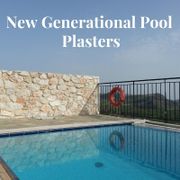How to Choose Between a Salt Water & Chlorine Swimming Pool

If you’re considering a swimming pool installation this year, deciding between a salt water pool and a chlorine one is the first step. Both offer years of family fun and plenty of benefits, but each has specific care needs. Below is a breakdown to help you decide what works best for your home.
Salt Water
Salt water swimming pool installations have several advantages. The first is a lower concentration of chlorine. These pools do contain some of this chemical but not as much as traditional pools, which is good news for your skin and swimsuits. Unlike traditional pools where you must add chlorine, the levels in a salt water pool occur by way of chemical electrolysis within the salt water generator in your setup. This component also stops algae accumulation.
While they’re more expensive to install, they do require less frequent maintenance, and the chemicals needed are less costly. They also only require an annual cleaning, which means less time spent draining water, changing filters, and scrubbing surfaces. Skimming for bugs and leaves is all the constant vigilance you’ll need.
Salt water designs require more electricity because of the generator that must run four to six hours a day in winter and 10 to 12 hours in summer. Because of the salt, surrounding plants and soil can be negatively affected by the water, as can pool features, like the liner or lighting fixtures. This problem can be fixed by asking your pool contractor for items designed to tolerate salt’s corrosive qualities.
Chlorine
 Traditional chlorine pools are typically less expensive to install. They also don’t use as much electricity, and certain maintenance tasks and repairs can be done yourself, such as cleaning the liner and testing chemical levels.
Traditional chlorine pools are typically less expensive to install. They also don’t use as much electricity, and certain maintenance tasks and repairs can be done yourself, such as cleaning the liner and testing chemical levels.
However, these pools need more regular maintenance to ensure chlorine is added at the right time and at the right levels. The pool must also be shocked every three weeks to stop bacteria growth. The pH should always be between 7.2 and 7.6, alkalinity between 100 and 150 parts per million, and calcium at 200-300 parts per million for a safe swimming experience, which means more frequent care on your part.
Chlorine can cause your skin to feel tight and itchy, especially if levels are out of balance. When water from the pool gets in your surrounding greenery, however, the levels are low enough that most vegetation should be okay.
For quality swimming pool installations in Chapel Hill, NC, call New Generation Pool Plasters. For more than 25 years, these pool construction experts have offered their customers the best products, accessories, and services in the industry at competitive prices. In addition to new pools, they also provide pool repair and regular maintenance to keep your outdoor oasis in top shape. To get started, call (267) 616-0406.
About the Business
Have a question? Ask the experts!
Send your question

